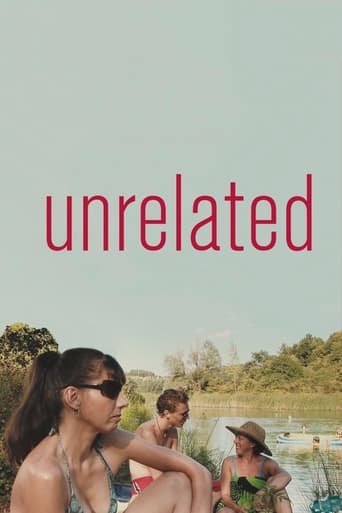Raghu Menon
I found this film on the MUBI platform and after a bit of apprehension, I decided to give it a go. It had all the existential angst and cathartic denouements that one would associate with an art-house feature that is out these days. Still, this film manages to provide a mildly amusing look at a group of English holidaymakers in a pastoral Tuscan retreat. Tuscany is as much of a character in the film as Kathryn Worth's Anna. I quite liked Joanna Hogg's use of camera, often introverted yet probing with its longing close-ups of Anna and Oakley. She removes the camera away from the action and towards the characters, subtly highlighting their emotional frailties and thriving insecurities. Shots are consumed, cigarettes are burnt and there is a whole lot of fun and games yet the recessive malaise is hardly disguised. Stylistically, there are hints of David Gordon Green in a few of the scenes not to mention the looming figures of Bergman and Antonioni. My only problem with the film despite its languid appeal is its derivative nature. This is an issue that she largely solved in her much better second feature, Archipelago. A promising debut nevertheless.
paul2001sw-1
'Unrelated' has an intriguing premise: a forty-something woman, on the run from an unhappy relationship, takes refuge in a Tuscan villa with an old (but not, it seems, particularly close) friend; and in fact, prefers to spend her time with the younger generation, perhaps trying to re-imagine the youth that got away. There's lots of potential here, and some acute observation, but also some flatness: director Joanna Hogg skilfully captures the mood of a particularly awful house-party, but it's not the sort of place that feels particularly enticing, and the combination of Anna's stupidity and the spoiled obnoxiousness of the beautiful youths who entrance her make for an unappealing and painful combination. If the story falls short of neat conclusions, it also falls short of what normally defines a good story - and the excessive use of static camera shots, leaving the viewer like a guest who'd rather be somewhere else, isn't especially subtle. Overall, this might have been better at half the length: there are some worthwhile ideas, but scene after scene of Anna sitting, painfully on the edge of a social gathering, feels unnecessary.
allmouth
The one thing this film was, was a brilliant portrayal of the obnoxious moneyed English at play in Tuscany, the arrogance and superciliousness of the younger characters and the emotionally uptight 'olds'. I'm not sure if this was the intention of all concerned as the programme notes at the cinema summarised the film as 'an illuminating and touching study of personal crises over ageing and our need to belong'. The Oakley character was particularly repulsive, superb acting there. As for Anna, her desperation oozed out of every hangdog look she delivered, perpetually on the verge of tears which she duly wept with absolutely no sympathy from myself. I'm guessing the dialogue was improvised, if not then the irritating 'banter' and outpourings reveal a script of true mastery, very naturally mundane with the 'youngs' speaking American TV influenced posh and the 'olds' confined to world weary tones. Overall, I couldn't have cared less if Anna had been gang raped or if they'd all been killed in the car crash, the world would be better off without people like these. By the time of Anna's revelation to V at the hotel I was so sick of her face that it was the one moment I laughed. It was bad judgement on my part going to see Unrelated and half way through I was close to walking out but like any disaster, it was difficult to avert my eyes, a woeful experience. I hope all concerned go on to better things.
ColeyFrancis
I watched this film recently at the Melbourne International Film Festival. I found it a provocative and, at times, uncomfortable film. The protagonist is Anna; a childless, unhappily married, pre-menopausal woman who, because of these things, believes herself to be on the periphery of society. During the course of the film she makes a series of questionable choices and eventually has a meltdown. This all takes place while Anna is holidaying in an Italian villa with some friends and their teenage children.The storytelling is often visual, with evocative lighting and cinematography. The dialogue is subdued. Shots are framed to show Anna's relationship to the environment she is inhabiting. In one scene she is on her mobile phone, emersed in an argument with her husband, her body turned away from a beautiful landscape; in another the camera is focused just on Anna's face, we can't see what is happening around her, we are also trapped in her self-absorption. A starkly thematic shot, towards the end of the film, captures everyone walking along a road; the other adults and the teenagers are together in two groups, Anna follows from behind but she walks alone. But this 'aloneness' is something she has created. She is so smothered by her misery she fails to recognize the ways in which she is part of the group: she is a friend to the adults and an extra adult to the teenagers. When she finds herself preferring the company of the teenagers, instead of being a mature and guiding influence, she becomes dangerously complicit in their reckless behaviour.By the end of the film Anna is somewhat calmed, she's had a cathartic talk with her sympathetic friend, something that was overdue. But I'm not sure how much progress she has made; it seems she might just fall back into her previous life without any real change, either within herself or externally. I was hoping she would transcend her 'unrelatedness', even embrace it and understand that she doesn't have to follow a conventional path to be involved.


